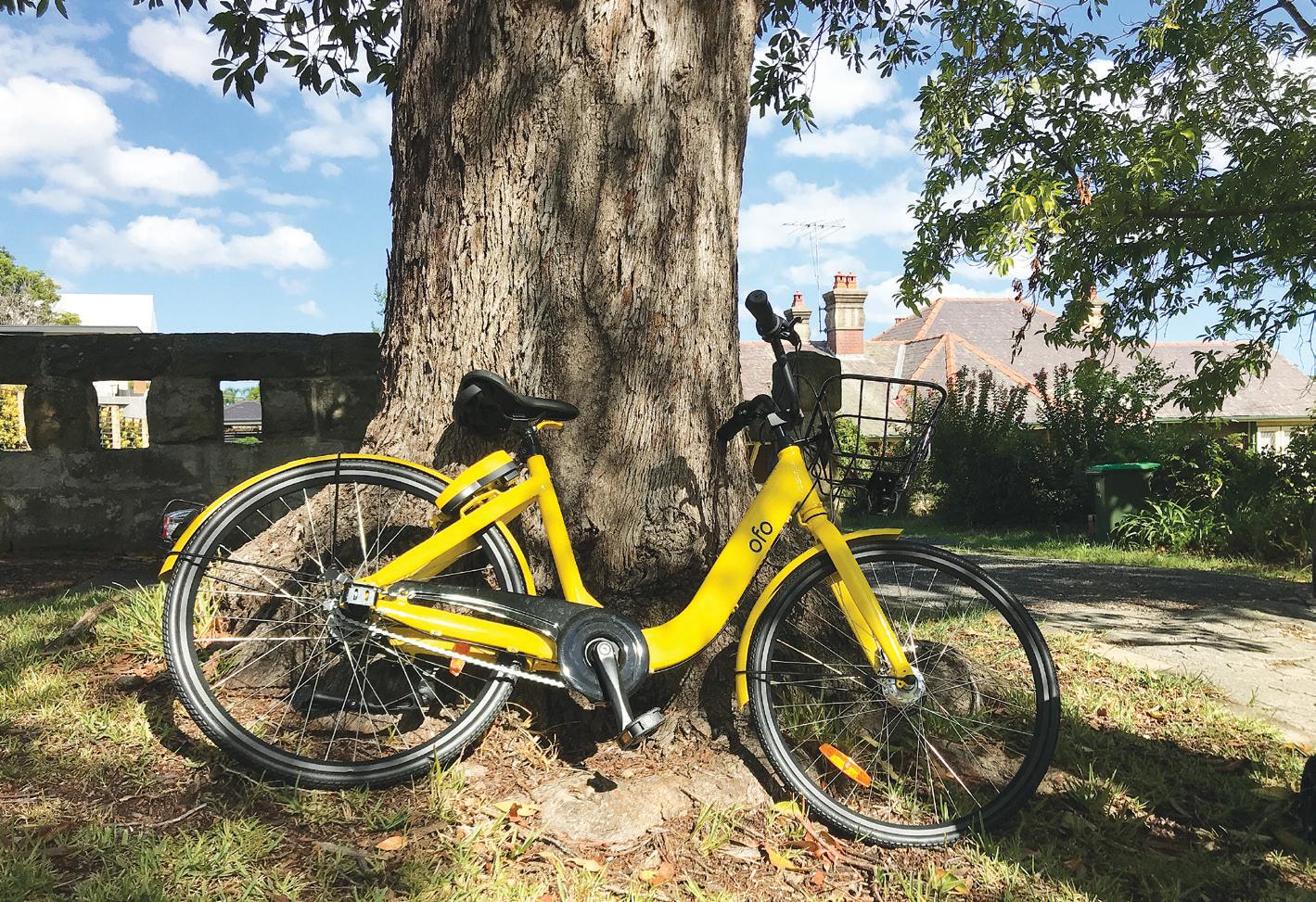
3 minute read
Bike sharing hits Lane Cove
On your bike!
You may have noticed an increasing number of bikes scattered around Lane Cove. Abandoned? Not quite. Rather these bikes are part of a new app-driven, dockless bicycle-sharing platform. By Shannen McDonald
The operators will tell you it’s all about helping to reduce harmful emissions and traffic decongestion. But let’s be real - it’s a business model and this environmentally friendly mode of transport isn’t all positive.
The principle of the dockless system is that the bikes can be used and then left anywhere. Which is why they have been appearing on footpaths; blocking walkways and shop entrances; in the middle of parks and playing fields; and some even popping up in the Sydney Harbour. Not ideal, right?
Sydney now has five privately owned and operated bike sharing companies – oBike; ofo; Mobike; Reddy Go; and newcomer EarthBike. The concept which has grown in popularity across Europe, Singapore and China, has now seen these companies spend the second half of 2017 scattering bikes across Australia.
Unlike other transport share options such as Uber that utilise vehicles already in use, thousands of bikes must be added to our streets in order for this scheme to work. Between the five companies, there is an estimated 5,500 bikes that have been released across Sydney since June of last year.
The ones that you are most likely to have seen locally are oBike (silver and yellow coloured); Ready Go (an Australian company which has distributed the red bikes), and ofo (yellow coloured). So how exactly does it work?
The hiring service operates completely from an app, where you can set up an account that is linked to your credit card. A once-off, refundable deposit of between $69 and $99 will then need to be made.
Once the account is activated, the GPS fitted bikes appear on a map enabling you to select the most conveniently located one for your use. This will remain reserved for you from 10 to 15 minutes, depending on the company you are using.
You then simply pick it up, unlock it using the app and there you have it - your very own bike to ride around as you please! What about helmets?
ofo, Mobike or Reddy Go bikes initially came with helmets, however this has become increasingly unpredictable as helmets either go missing or are damaged.
In NSW the law requires a helmet to be worn whenever riding a bike, and although the bike hire websites do promote safety through helmet usage, it is up to the individual to ensure they are riding with one. And you can imagine the frustration of arriving at your reserved bike only to find a helmet isn’t available.
How much does it cost?
$1.99 for 30 minutes. The companies have also embedded incentives into their price model, with a credit point system encouraging good behaviour and usage so that the more credit points you have, the cheaper your fares become. Dwindling credit points due to irresponsible behaviour could leave customers facing higher fares of up to $19.99 for 30 minutes.
Managing the downside
Lane Cove Council, like many others across Sydney, doesn’t deny the potential and advantages of the bike sharing scheme. However there are obvious problems and concerns with how it is being implemented into Sydney’s suburbs.
At its March meeting, Council agreed to adopt the Inner Sydney Bike Share Guidelines. These guidelines have been devised by six Sydney councils and set out minimum standards and expectations for bike share operators.
The guidelines specify that operators must enable easy reporting of faulty or damaged bikes, missing helmets or bikes parked in inappropriate locations through their app, website and email and that a fully dedicated phone number is made available 24/7.
The guidelines also cover safe bike placement; collection and relocation of faulty, damaged or unused bikes; and timeframes that apply to help keep bikes moving, so that they are not left in one location for too long.
Between 1-7 days is permitted, but beyond this, the operator is required to relocate the bike or offer incentives to customers to ride the bike to another destination. If a bike has not been moved after 11 days, Council or the public can instruct the operator to relocate the bike. After 15 days, the bike can be impounded by Council with a fee payable for its release. A further 28 days after impoundment, the bike can be recycled by Council.
While Council intends to work together with bike share operators to achieve their sustainable transport goals, it is prepared to assist in the removal of hazardous bikes wherever necessary, consistent with the new guidelines.








